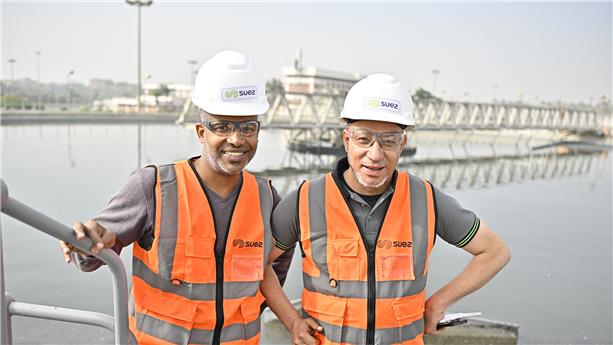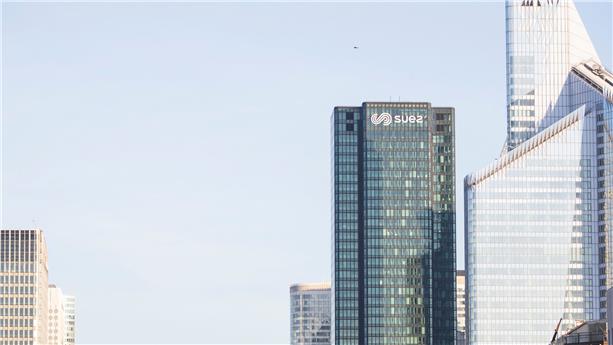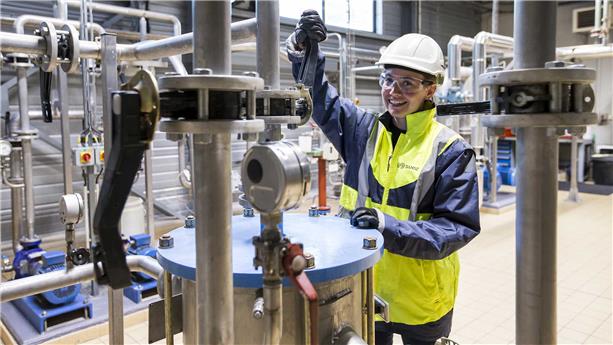
SUEZ remains committed to social inclusion, with a target of inclusion of 1,500 people in France by 2021
A commitment and a model for inclusion
SUEZ is an important partner of the Social and Solidarity Economy, as evidenced by its long-standing commitment to professional integration. Some of its business lines, particularly recycling and waste recovery, are accessible to low-skilled people, acting as an effective springboard for who are unemployed.
In 2002, the Group founded its own inclusive employment subsidiary, Rebond Insertion, which has been certified as a socially responsible and useful company (Entreprise Solidaire d’Utilité Sociale) by the French government. Its goal is to help the long-term unemployed (1) return to work. In France, it employs more than 500 people every year via social inclusion. Specifically, employment involves sorting activities, city center waste collection and urban sanitation. The SUEZ subsidiary boasts a “high employment success” rate (2), with over 70% of training courses leading to qualifications.
SUEZ has forged solid and sustainable partnerships with social inclusion leaders such as ARES, VITAMINE T, ID’EES and ENVIE. The Group works with all four players on a regular basis, entrusting them with subcontracting missions in all its activities. In 2019, the partnerships accounted for more than 700 social inclusion jobs at SUEZ sites in France.
Building the circular economy together by supporting the creation of new services
SUEZ remains convinced that the most impactful actions happen on the ground, locally. In 2012, the Group created in Bordeaux city the Maison pour Rebondir, a first-of-its-kind experimental scheme to strengthen the contribution of SUEZ activities to employment in the region. Drawing on this experience, which has helped to create over 700 local jobs, the Maison pour Rebondir has since deployed into other regions including the Paris and Rhône-Alpes regions. The Maisons operate as local hubs, facilitating collaboration between SUEZ subsidiaries and local social and solidarity economy ecosystems. It focuses on inclusive recruitment in SUEZ business lines and the development of new job opportunities, whether in preventing food waste, the reuse or collection and recovery of niche waste (cigarette butts, used edible oils, etc.).
The Maisons pour Rebondir run business incubators, supporting more than 120 entrepreneurs ,68% of which are women, every year. SUEZ trains and supports jobseekers over the long term in the creation of their companies to support local circular economy ecosystems over the long term.
Since 2019 and the creation of a new department dedicated to social innovation, the Group capitalises on its experience and promote, even more actively, collaboration with the SSE, in order to meet the major challenges of the ecological transition.
* * * *
SUEZ projects and initiatives in France:
“J'Entreprends” is a business creation support program dedicated to job seekers, organized by the Maison for Hauts-de-Seine department and Bordeaux. The 15 project leaders follow an eight-month incubation program. It comprises the following: one-on-one coaching including company registration, 350 hours of specialized training in entrepreneurship and networking with industry professionals. To date, the scheme has supported 191 entrepreneurs in the Bordeaux and Paris regions in the launch of their business projects. To this end, the program has successfully developed new local and socially responsible services.
SUEZ has also joined forces with ID’EES and HUMANDO on a project for the Building and Construction Work Businesses Training Center in Trappes (southwest Paris region). The Group co-developed a training and recruitment solution for jobseekers to meet the recruitment demands of high-pressure jobs and train a new generation in environmental-related businesses. Candidates first confirm their interest by enrolling on an immersion program in a SUEZ. They then commit to three months of full-time training before joining the SUEZ teams for six months of temporary work, followed by permanent contracts. TSince 2019,19 people has been trained.
At the SUEZ waste sorting center in Limeil-Brévannes (east Paris region), more than 50 employees from the ARES Group work each year with SUEZ teams to sort and recycle waste. In 2019, 132 social inclusion employees were supported, i.e. 56 full-time equivalents on a full year basis totaling 84,602 integration hours. Success rates were high, ending at 73% for permanent and fixed-term contracts and training.
In Créteil (southeast Paris), in partnership with VITAMINE T social inclusion Group, SUEZ employes a team of 19 people at its subsidiary, Vitaservices. The team manages the trash containers for the infectious medical waste (D.A.S.R.I.) treatment chain at Valo'Marne. The latter is the largest infectious medical waste-to-energy center in Europe, operated by SUEZ.
The Aix-Marseille-Provence metropolitan area has chosen SUEZ subsidiary, Rebond Insertion, with the responsibility of delivering several services. These include urban sanitation, customized professional solutions, reusable cardboard production and inclusion through employment. Rebond Insertion provides door-to-door collection services for retailer cardboard boxes in downtown Marseille, with a commitment to a minimum recovery rate of 85%. This service, which falls under the twofold scope of the circular economy and Social and Solidarity Economy, will soon be extended to the collection of wood, glass, plastic and paper from retailers. The offer complements Rebond Insertion's activities in the Bouches-du-Rhône region in southern France, where it employed 50 people in 2019 at the Jas de Rhodes sorting center.
Val Plus, located in Langon Gironde region (33, has been an active SUEZ subsidiary since 2015. It specializes in the sorting and dismantling of mattresses, the collection of electrical and electronic waste (E.E.W.) and the sorting of selective collections and plastics. To date, the subsidiary has reintegrated 46 people in social inclusion jobs. 1,000 tons of waste are collected on a monthly basis, more than 800 of which contain reusable material which is recycled.
SUEZ has leveraged the expertise of its Maison pour Rebondir scheme to launch a dedicated support program for circular economy project leaders. Its purpose: develop and promote new services for the circular economy. As it stands, 20 projects are ongoing in the Bordeaux and Paris regions with a focus on composting, waste sorting awareness, waste reuse as well as deposit-return systems. One of the supported projects is Explic'eat, which aims to limit food waste by recovering unsold goods from bakeries. With its “crumbler,” which is a makeshift bread crusher, it produces flour used to make bread and pastries. The company, which employs 3 people, offers diagnostics on food waste, culinary workshops and training courses for collective restaurants, local communities, schools, hotels, nursing homes and hospitals. www.expliceat.fr
SUEZ’s regional structure “Fondation Terre d’Initiatives Solidaires” (Foundation for local on-the-ground solidarity initiatives) works with the Lyon Metropolitan Area with the backing of the Maison pour Rebondir to advance regional social innovation projects. One example is Booster Saint Jean. The non-profit organization has a team of over 90 former long-term unemployed persons on permanent contracts. Its purpose: create regional activities in the metropolitan area aimed at waste collection coupled with the resale of games and toys by upskilling the long-term unemployed. lebooster.org or CoCoShaker in Clermont-Ferrand (central France) is an incubator for social entrepreneurs wishing to support social innovation to meet the social and environmental needs of the Auvergne-Rhône Alpes region (southeast central France). Since 2015, the incubator has consulted with more than 150 project leaders with over 30 of them reporting success, particularly in developing a 3-year Circular Economy plan. cocoshaker.fr
The ATMO’s Captothèque ( (in 69, 38, 73, 26, 42, 63 depatments),. The France’s Air Quality Federation is an observatory for monitoring and information on air quality offers a free loan service for micro-sensors. It is currently being tested in the cities of Lyon, Grenoble and Clermont-Ferrand gradually deployed throughout the Auvergne-Rhône-Alpes Region to analyse air quality and offer citizens the opportunity to explore the city in search of qualitative indications of the air they breathe in their daily lives. captotheque.fr
The HOPE program, which helps refugees find employment is co-led by the French Directorate of Aliens, the Ministry of the Interior and the French Directorate of Aliens for the Ministry of Labor. In 2018, SUEZjoined forces with OPCALIA (French government accredited fund-collecting agency) and AFPA (Association for the Professional Training of Adults) to train a class of 12 refugees as truck drivers— a highly sought-after skill in France—and support them in their professional integration. The 12 trainees trained for six months under the supervision of SUEZ employees. They then began the next chapter in their careers having secured professional training contracts in various Group entities, particularly in the Paris and Auvergne-Rhône-Alpes regions.
Since 2017, SUEZ has a partnership with ENVIE Rhône-Alpes Group at its center in Feyzin (69 departmentto integrate a night shift to ensure the continuity of a Waste Electrical and Electronic Equipment (WEEE) dismantling line. In 2020, the cooperation with the integration company will be strengthened and SUEZ will entrust it with the daytime management of a second line. A total of 15 people on social integration schemes work on a daily basis to operate the dismantling lines, fully integrated with SUEZ teams.
1 Includes those on welfare benefits, seniors, disabled workers and unskilled young professionals aged under 26.
2 Permanent contracts, fixed-term contracts lasting more than six months and temporary contracts.


